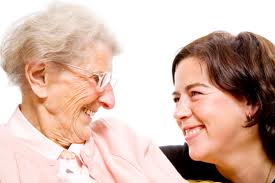By the National Institute on Aging (NIA)
 Alzheimer’s Caregiver Guide and Tips on Acute Hospitalization is a 1-hour online continuing education course that offers strategies for managing the everyday challenges of caring for a person with Alzheimer’s disease and includes tips on acute hospitalization, which presents a new environment filled with strange sights, odors and sounds, changes in daily routines, along with new medications and tests. Many caregivers have found it helpful to use the strategies described in this course for dealing with difficult behaviors and stressful situations. Course #10-81 | 2010 | 17 pages | 7 posttest questions | $19
Alzheimer’s Caregiver Guide and Tips on Acute Hospitalization is a 1-hour online continuing education course that offers strategies for managing the everyday challenges of caring for a person with Alzheimer’s disease and includes tips on acute hospitalization, which presents a new environment filled with strange sights, odors and sounds, changes in daily routines, along with new medications and tests. Many caregivers have found it helpful to use the strategies described in this course for dealing with difficult behaviors and stressful situations. Course #10-81 | 2010 | 17 pages | 7 posttest questions | $19
This course is presented in two parts. Part 1 offers strategies for managing the everyday challenges of caring for a person with Alzheimer’s disease, a difficult task that can quickly become overwhelming. Research has shown that caregivers themselves often are at increased risk for depression and illness. Each day brings new challenges as the caregiver copes with changing levels of ability and new patterns of behavior. Many caregivers have found it helpful to use the strategies described in this course for dealing with difficult behaviors and stressful situations.
Part 2 includes tips on acute hospitalization, which presents a new environment filled with strange sights, odors and sounds, changes in daily routines, along with new medications and tests. This section is intended to help professionals and family members meet the needs of hospitalized Alzheimer’s patients by offering facts about Alzheimer’s disease, communication tips, personal care techniques, and suggestions for working with behaviors and environmental factors in both the ER and in the hospital room.
This online course provides instant access to the course materials (PDF download) and CE test. Successful completion of the online CE test (80% required to pass, 3 chances to take) and course evaluation are required to earn a certificate of completion. You can print the test (download test from My Courses tab of your account after purchasing) to mark your answers on it while reading the course document. Then submit online when ready to receive credit.
Professional Development Resources is approved by the American Psychological Association (APA) to sponsor continuing education for psychologists; the National Board of Certified Counselors (NBCC ACEP #5590); the Association of Social Work Boards (ASWB Provider #1046, ACE Program); the American Occupational Therapy Association (AOTA Provider #3159); the Commission on Dietetic Registration (CDR Provider #PR001); the California Board of Behavioral Sciences (#PCE1625); the Florida Boards of Social Work, Mental Health Counseling and Marriage and Family Therapy (#BAP346), Psychology & School Psychology (#50-1635), Dietetics & Nutrition (#50-1635), and Occupational Therapy Practice (#34); the Ohio Counselor, Social Worker & MFT Board (#RCST100501); the South Carolina Board of Professional Counselors & MFTs (#193); and the Texas Board of Examiners of Marriage & Family Therapists (#114) and State Board of Social Worker Examiners (#5678).







